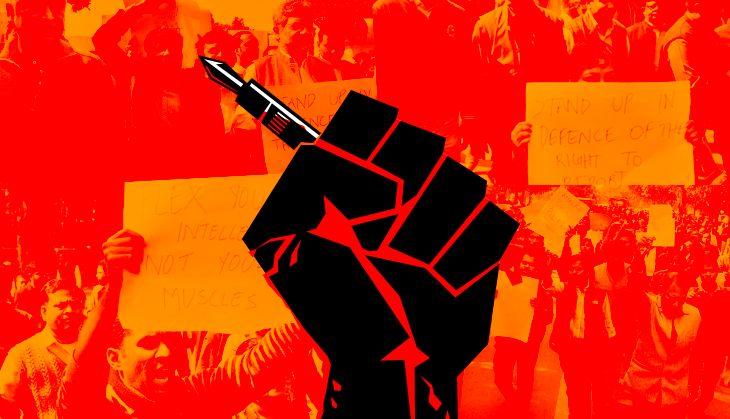Safia Ramzan
In theory, Article 19 of the Constitution of Pakistan guarantees its citizens the right to freedom of speech and expression. It reads: “Every citizen shall have the right to freedom of speech and expression, and there shall be freedom of the press, subject to any reasonable restrictions imposed by law in the interest of the glory of Islam, the integrity, security or defense of Pakistan, friendly relations with foreign states, public order, decency or morality, or in relation to contempt of court, commission of or incitement to an offence.” These exceptions form the critical phrase: “subject to law.”
But in practice, this very clause—“subject to law”—often becomes the gateway through which the right to free speech is diluted, suppressed, and in some cases, completely denied. It raises a crucial question for today’s Pakistan: Does the legal condition protect freedom of expression, or does it serve to limit it?
Freedom of expression is a cornerstone of democratic society. It allows citizens to speak truth to power, hold governments accountable, engage in public debate, and express dissent. In Pakistan, however, the line between lawful restriction and political suppression has become increasingly blurry. Whether it’s journalists, civil society activists, political opponents, or even ordinary citizens on social media—expressing a critical opinion can lead to harassment, legal action, arrest, or worse.
The ambiguity of the “reasonable restrictions” listed in Article 19 has allowed successive governments—both civilian and military—to use the law as a weapon. Terms like “glory of Islam,” “national security,” and “public order” are often undefined or loosely interpreted. As a result, a tweet criticizing the establishment, a newspaper article questioning a policy, or a protest against injustice can be quickly labeled as a threat to national interests.
One of the most alarming aspects is the role of laws such as the Pakistan Electronic Crimes Act (PECA) 2016, which, under the guise of regulating cybercrime, has been repeatedly used to stifle dissent. Journalists and social media users have faced raids, FIRs, and imprisonment under vague provisions such as “spreading false information” or “defaming institutions.” Rather than providing protection, these laws act as tools of intimidation.
Similarly, the blasphemy laws, while meant to protect religious harmony, have often been misused to target individuals for personal, sectarian, or political reasons. The fear of being accused of blasphemy silences not only religious discourse but also intellectual inquiry and cultural debate. Even discussing reform or misuse of these laws can be dangerously misinterpreted.
Moreover, the media landscape in Pakistan has increasingly come under pressure. Self-censorship has become the norm, not the exception. Many journalists admit off the record that there are “red lines” they dare not cross—topics such as the military’s role in politics, enforced disappearances, or certain court decisions are considered off-limits. Editors and media owners face commercial and regulatory pressure to control the narrative. News channels have been taken off air, websites blocked, and newspapers denied distribution simply for reporting uncomfortable truths.
Ironically, while traditional media is tightly monitored, digital media—once considered a space for open dialogue—is now also under watch. Surveillance, disinformation campaigns, and online harassment—especially targeting women—have created a toxic environment. The right to dissent, a fundamental democratic right, is treated almost like a criminal offense.
However, it would be unfair to ignore the need for certain limitations on speech in any society. No democracy allows absolute freedom of expression. Hate speech, incitement to violence, defamation, and threats to public safety are universally restricted. But these restrictions must be clearly defined, narrowly applied, and enforced through fair legal processes. In Pakistan’s case, the problem is that these boundaries are vague, arbitrarily enforced, and frequently used for political purposes.
Please, subscribe to the YouTube channel of republicpolicy.com
A deeper concern lies in the lack of judicial activism in protecting freedom of expression. Courts in democratic societies act as custodians of civil liberties. In Pakistan, however, the judiciary has not consistently safeguarded this right. In many cases, courts have sided with the executive narrative or failed to provide timely relief to victims of censorship and legal harassment. This weakens public trust in the justice system as a defender of constitutional rights.
To truly protect Article 19, Pakistan needs legal and institutional reform. Laws governing media, speech, and cyber activity must be revisited to ensure they uphold democratic principles rather than suppress them. Regulatory bodies such as PEMRA and PTA should be made independent, accountable, and transparent. Most importantly, the state must foster a culture of tolerance and critical thinking—where disagreement is not seen as disloyalty, and debate is not mistaken for rebellion.
Civil society also has a role to play. Citizens must remain vigilant and vocal in defending their rights. Journalists, academics, lawyers, and activists must build alliances to resist legal overreach and advocate for meaningful reform. Freedom of expression is not just a legal right; it is a cultural and political necessity for Pakistan’s progress.
In conclusion, Article 19, with its clause “subject to law,” was designed to provide a balanced framework—granting freedom while ensuring responsibility. Unfortunately, in today’s Pakistan, that balance is lost. Instead of protecting speech, the law is too often used to silence it. Unless this trend is reversed through legal clarity, institutional reform, and democratic resolve, the promise of free expression in Pakistan will remain a constitutional illusion rather than a lived reality.
















